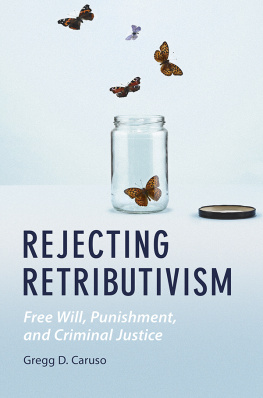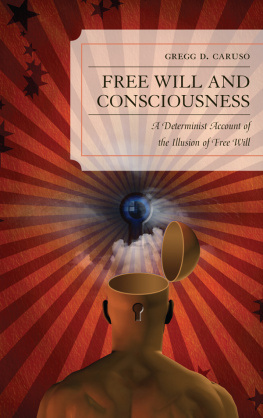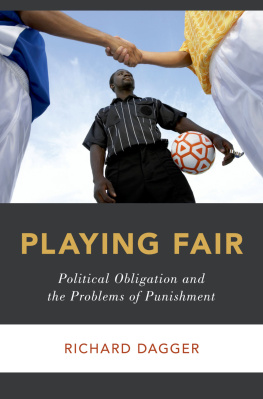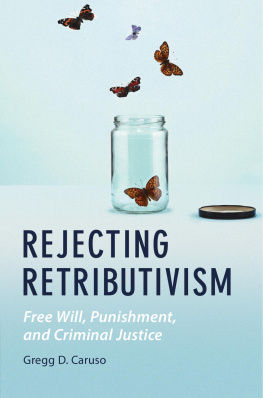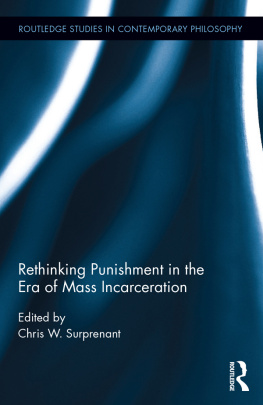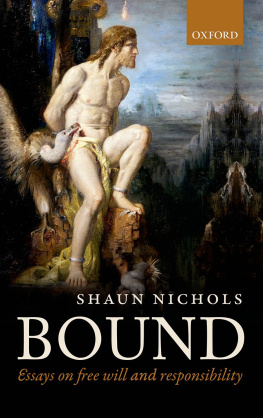Within the criminal justice system, one of the most prominent justifications for legal punishment is retributivism. The retributive justification of legal punishment maintains that wrongdoers are morally responsible for their actions and deserve to be punished in proportion to their wrongdoing. This book argues against retributivism and develops a viable alternative that is both ethically defensible and practical. Introducing six distinct reasons for rejecting retributivism, Gregg D. Caruso contends that it is unclear that agents possess the kind of free will and moral responsibility needed to justify this view of punishment. While a number of alternatives to retributivism exist including consequentialist deterrence, educational, and communicative theories they have ethical problems of their own. Moving beyond existing theories, Caruso presents a new non-retributive approach called the public health-quarantine model. In stark contrast to retributivism, the public health-quarantine model provides a more human, holistic, and effective approach to dealing with criminal behavior.
Gregg D. Caruso is Professor of Philosophy at SUNY Corning and Honorary Professor of Philosophy at Macquarie University. He is also the Co-Director of the Justice Without Retribution Network (JWRN) at the University of Aberdeen School of Law. His research interests include free will, agency, and responsibility, as well as philosophy of mind, cognitive science, neuroethics, moral psychology, criminal law, punishment, and public policy. His books include Just Deserts: Debating Free Will (with Daniel C. Dennett, 2021), Free Will and Consciousness: A Determinist Account of the Illusion of Free Will (2012), Exploring the Illusion of Free Will and Moral Responsibility (2013), Science and Religion: 5 Questions (2014), Neuroexistentialism: Meaning, Morals, and Purpose in the Age of Neuroscience (co-edited with Owen Flanagan), and Free Will Skepticism in Law and Society (co-edited with Elizabeth Shaw and Derk Pereboom).
Law and the Cognitive Sciences publishes book monographs exploring connections between law and the cognitive sciences. The books will be of interest to academics, students, and practitioners, and in particular to the scholars in the fields of legal theory, philosophy of law, psychology of law, the theory of law and artificial intelligence, general theory of private and criminal law, and evidence.
Gregg D. Caruso
University Printing House, Cambridge CB 2 8 BS , United Kingdom
One Liberty Plaza, 20th Floor, New York, NY 10006, USA
477 Williamstown Road, Port Melbourne, VIC 3207, Australia
314321, 3rd Floor, Plot 3, Splendor Forum, Jasola District Centre, New Delhi 110025, India
79 Anson Road, #0604/06, Singapore 079906
Cambridge University Press is part of the University of Cambridge.
It furthers the Universitys mission by disseminating knowledge in the pursuit of education, learning, and research at the highest international levels of excellence.
www.cambridge.org
Information on this title: www.cambridge.org/9781108484701
DOI : 10.1017/9781108689304
Gregg D. Caruso 2021
This publication is in copyright. Subject to statutory exception and to the provisions of relevant collective licensing agreements, no reproduction of any part may take place without the written permission of Cambridge University Press.
First published 2021
A catalogue record for this publication is available from the British Library.
Library of Congress Cataloging-in-Publication Data
Names: Caruso, Gregg D., author.
Title: Rejecting retributivism : free will, punishment, and criminal justice / Gregg D. Caruso, State University of New York Corning Humanities and Social Sciences.
Description: Cambridge, United Kingdom ; New York, NY : Cambridge University Press, 2021. | Series: Law and the cognitive sciences | Includes bibliographical references and index.
Identifiers: LCCN 2020046886 | ISBN 9781108484701 (hardback) | ISBN 9781108723480 (paperback) | ISBN 9781108689304 (ebook)
Subjects: LCSH: Lex talionis. | Punishment Philosophy. | Criminal justice, Administration of Philosophy. | Free will and determinism Philosophy.
Classification: LCC K 5103 . C 369 2021 | DDC 345/.077301dc23
LC record available at https://lccn.loc.gov/2020046886
ISBN 978-1-108-48470-1 Hardback
Cambridge University Press has no responsibility for the persistence or accuracy of URLs for external or third-party internet websites referred to in this publication and does not guarantee that any content on such websites is, or will remain, accurate or appropriate.
In memory of
Louis and Dolores Caruso
For
Elaini and Maya
Acknowledgments
The majority of this book was written during a sabbatical from SUNY Corning at the School of Law at the University of Aberdeen in Scotland during the fall semester of 2019. I would like to thank Elizabeth Shaw and Greg Gordon, as well as members of the law school and philosophy department at the University of Aberdeen, for their warm welcome and for providing me with the support and facilities needed to research and write this book. The book benefited greatly from my numerous conversations with Elizabeth Shaw as well as my head-clearing walks in the Scottish countryside and highlands. I would also like to thank Dan and Joy Shaw, John and Margaret Callender, Nigel Dower, Patricia Clarke, J. R. Cameron, Gerard Hough, Beth Lord, Federico Luzzi, Luca Moretti, Stephan Torre, and Dasha Shapovalova for making my stay in Aberdeen a pleasant one.
Because this book builds on previous work, and because it has been a long time in the making, it has benefited enormously from the feedback and comments of numerous people. While I cannot thank them all here, I am especially indebted to the following people for their valuable input over the years: Derk Pereboom, Bruce Waller, Neil Levy, Farah Focquaert, Elizabeth Shaw, Stephen Morris, Michael Corrado, Benjamin Vilhauer, Saul Smilansky, Manuel Vargas, Robert Kane, John Martin Fischer, Eddy Nahmias, Stephen J. Morse, Sofia Jeppsson, Justin Caouett, Katrina Sifferd, Nicole Vincent, John Lemos, Oisin Deery, Ish Haji, Tom Clarke, Joe Campbell, Grace Campbell, Owen Flanagan, Victor Tadros, Paul Russell, Erin Kelly, Michael McKenna, Gunnar Bjrnsson, Dana Nelkin, Thomas Nadelhoffer, Marueen Sie, David Shoemaker, Joseph Margulies, Jennifer Chandler, Daniel Dennett, Rob Talisse, Rick Repetti, Bana Bashour, John Callender, Brian Earp, Jim Everett, Azim Shariff, Walter Sinnott-Armstrong, Adrian Raine, Marcus Arvan, Paul Bloom, Taylor Cyr, Patrick Todd, Constantine Sandis, Thomas Douglas, John Tasioulas, Allan McCay, Jeanette Kennett, Richard Menary, Bryce Huebner, Ragina Rini, Kevin Timpe, Matthew Kramer, Chris Surprenant, Christian Coseru, Wesley Buckwalter, Al Mele, Andrei Buckareff, Cory Clarke, Roman Altshuler, Brandon Warmke, Richard Double, David Rosenthal, Rik Peels, Bob Hartman, Fritz McDonald, Robyn Repko Waller, Justin Capes, Per Milam, Leigh Vicens, Josh Weisberg, Ophelia Deroy, Travis Timmerman, Nomy Arpaly, Mark Balaguer, Michael Brent, Melissa Snater, Marianne McAllister, Andrea Glenn, Mario De Caro, Thom Books, Mich Ciurria, Josh May, Ken Levy, Helen Steward, Tamler Sommers, David Cummiskey, Matt Stichter, Ben Abelson, Paul Davies, Shaun Nichols, Stephen Kershnar, Alan White, Christian List, Barry Smith, Kristin Mickelson, Paul Noordhof, Michael Robinson, Daniel Speak, Philip Swenson, Ryan Lake, Neal Tognazzini, and Craig Agule.

